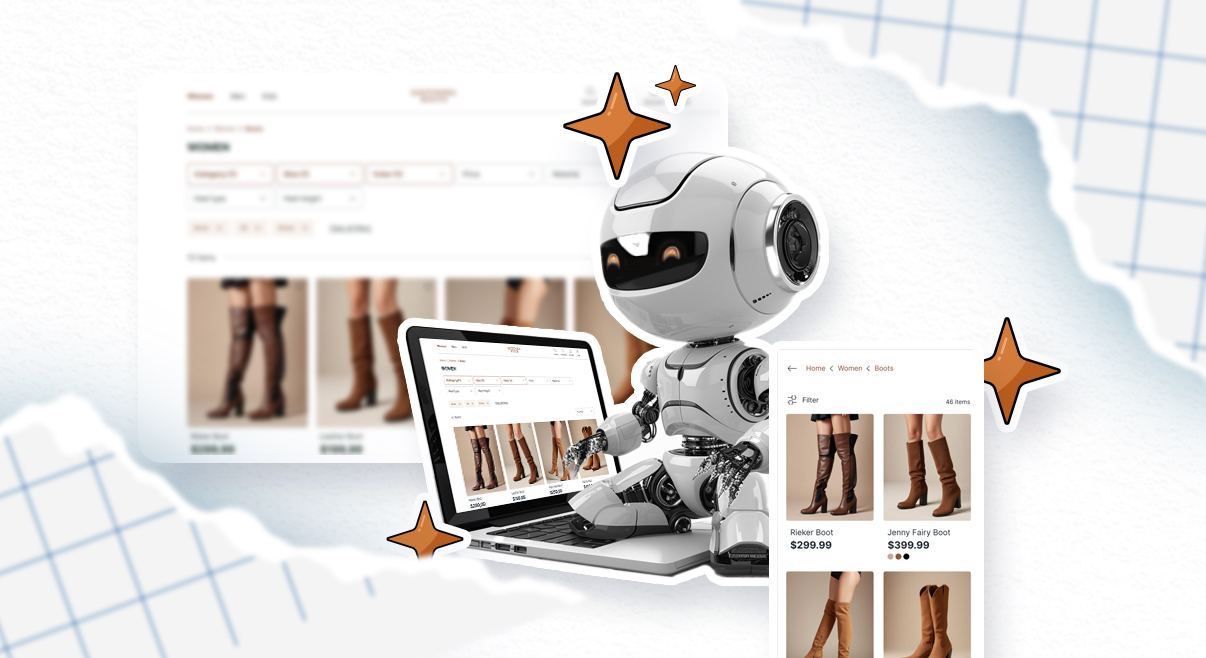Big changes are coming to the ecommerce business thanks to AI development. There are many signs that the way people buy things will soon be different from how they do it now. Companies can do more creative stuff for their customers than ever before, thanks to the rise of generative AI for ecommerce.
Understanding AI in ECommerce
Definition and Basic Concepts of AI
Artificial intelligence is the study of how to make robots that can think and learn act like humans.
AI in the ecommerce context
In ecommerce, AI means using algorithms and data analytics to improve the process of decision-making, enhance interactions with customers, and make different business processes run more smoothly.
AI in ecommerce can come in many forms like:
- Chatbots
- Machine learning
- Image recognition
- Speech recognition

How AI is Specifically Applied in the ECommerce Sector
AI is now used in everything, from complicated data analysis tools to ecommerce tools that predict how customers will act.
Customizing the shopping experience, keeping track of inventory, finding the best price strategies, and even marketing efforts can be made much easier based on what the customer wants.
Enhancing Customer Experiences with AI for ECommerce
Personalized Recommendations and Product Suggestions
The most obvious ways AI for ecommerce relates to personalized product recommendations. By examining a consumer’s surfing behavior, purchase trends, and other data, artificial intelligence might suggest their likely interests. Which improves customer loyalty and the shopping experience.
This instrument might also be able to operate without knowing about past transactions currently. For instance, our SilkAI Stylist may create the entire look just on one item of clothes the client loves. And then, should one like to include that fantasy fit into the cart.
AI Customer Service
Virtual assistants and AI chatbots have enabled ecommerce to rethink the idea of online customer support completely.
It helps to track orders and provide product information 24/7, they can respond to any type of consumer question.
Such chatbots can also act as personal sales advisors to customers. For instance, asking a customer if he would like to see more of some kind of product, or perhaps in the case of fashion ecommerce, showing some clothes that go well with the type of clothing a customer has chosen while considering the current trends!
Personalized Marketing and Targeted Advertising
AI enables highly targeted marketing campaigns by analyzing customer data to determine the best time and method to reach potential buyers.
Personalized email campaigns, dynamic website content, and tailored social media ads showing products tailored for customers are just a few examples of how AI for ecommerce enhances marketing efforts.
Thanks to AI, ecommerce can show the customer appropriate products that perfectly match his taste and take into account current trends.
Visual Search
Visual search in ecommerce leverages AI to allow users to look for products using a photo instead of text. For instance, our SilkAI Explorer will enable searching for clothes similar to the ones seen in an image in portals or other stores.
For instance, if a customer likes a product, they can use a photo to search your store and find that exact item or similar options. This feature not only boosts customer engagement but also increases the chances of making a sale.
All such features could be integrated with the accounts of the customers in an infinite number of ways, providing inspiration to designers as well as enhancing the shopping experience.
Future Trends in AI for ECommerce
Predictions for AI Advancements in ECommerce
AI for ecommerce will play a huge role in shaping the future of the industry.
The global AI-enabled ecommerce solutions market is valued at $3.71 billion, as per the latest research of InsightAce Analytics in 2021. The market is expected to grow manifold and stand at $16.8 billion by 2030, with a CAGR of 15.7% between 2021 and 2030.
Moreover, according to The state of AI in early 2024 (McKinsey) the percentage of respondents who reported that their organizations are regularly using gen AI, nearly doubled from the previous survey.
This is a clear signal that, in order not to be left behind, it will be safe to adapt to the trend and learn to use AI at work.
How Businesses Can Prepare for AI Innovations?
Ecommerce businesses should invest in AI research and development, or at least stay up to date with what’s happening in AI for ecommerce.
Read, learn, and focus on implementing new technologies. It is also worth adopting certain thinking – openness to innovation will be key.
According to the previously cited McKinsey study, in the case of consumer goods and retail, as many as 64% of organizations invest more than 5 percent of their digital budgets in generative AI and analytical AI.

Conclusion
AI has influenced ecommerce in significant ways like by making the customer experience more personalized and making operations more efficient.
Generative AI gives businesses an edge over other organizations by helping them meet customer standards. As AI technology improves, it will be important for online retailers to keep up with updates in genrative AI world.
FAQ
1. What is AI?
Answer: It’s Artificial Intelligence, simply speaking it’s the name for tools that are designed to think and learn like people.
2. How is AI used in ecommerce?
Answer: AI in ecommerce is used for personalized product recommendations, chatbots, visual search, and targeted advertising. It helps to optimize business processes and improving customer experience.
4. How do AI-driven chatbots work in ecommerce?
Answer: In ecommerce, AI-powered robots can answer questions from customers, give them information about products, and help them track their orders 24/7 . As virtual assistants, they help customers and give them personalized advice.
5. What are the future trends of AI in ecommerce?
Answer: The future of AI in ecommerce includes advanced personalization, improved customer service, and better inventory management. The market for AI in ecommerce is expected to grow significantly, offering more innovative solutions.
6. What is the projected market growth for AI in ecommerce?
Answer: AI for ecommerce solutions market is expected to grow from $3.71 billion in 2021 to $16.8 billion by 2030, with a compound annual growth rate (CAGR) of 15.7%.

You may also be interested in:
Fashion Labels: The Essential Guide for Clothing Brands
Fashion labels play a crucial role in your brand and shape how customers perceive your product. If you're launching a new product line and feel unsure about how to select the right labels, this guide will serve as your go-to resource!
Guide to Care Labels for Fashion Brands: Compliance & Sustainability
Care labels are a vital communication tool for customer satisfaction, legal compliance, and reinforcing your brand values. Whether you're a fashion startup, e-commerce business, or independent designer, understanding care labels is non-negotiable.




